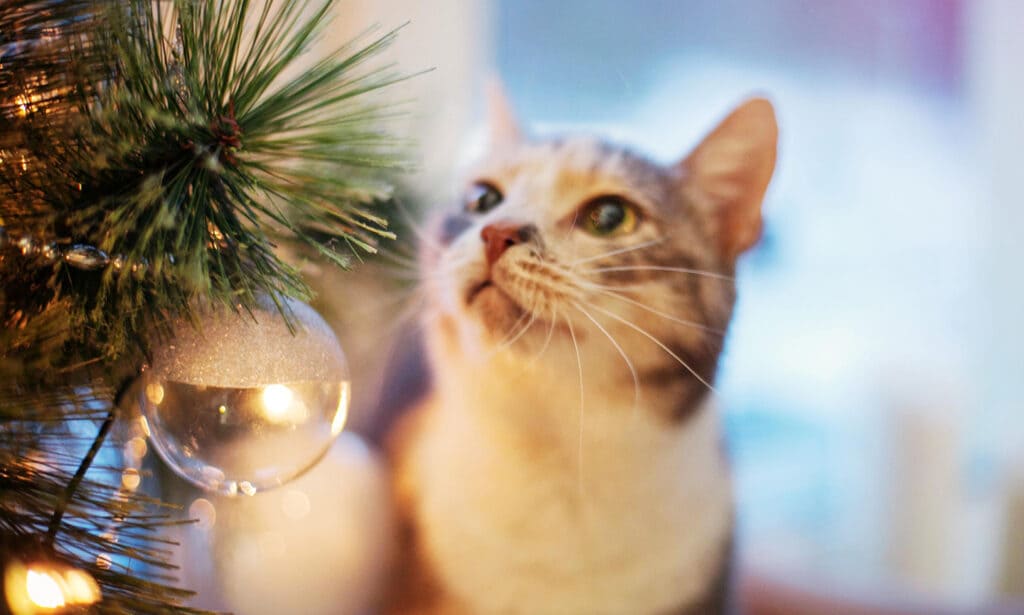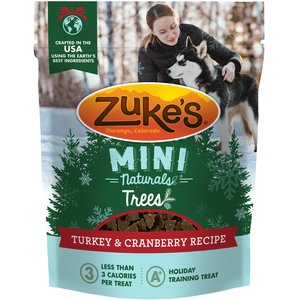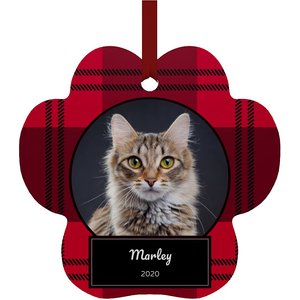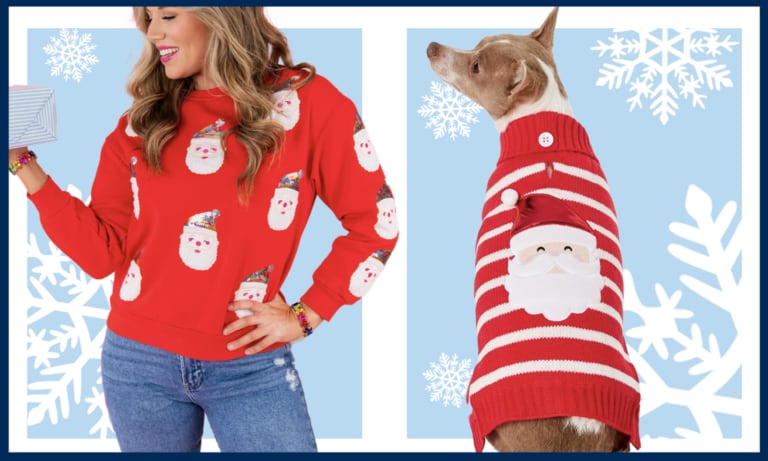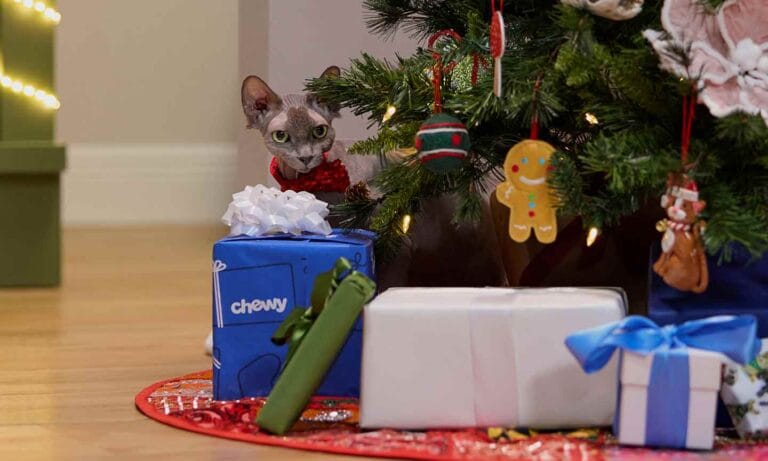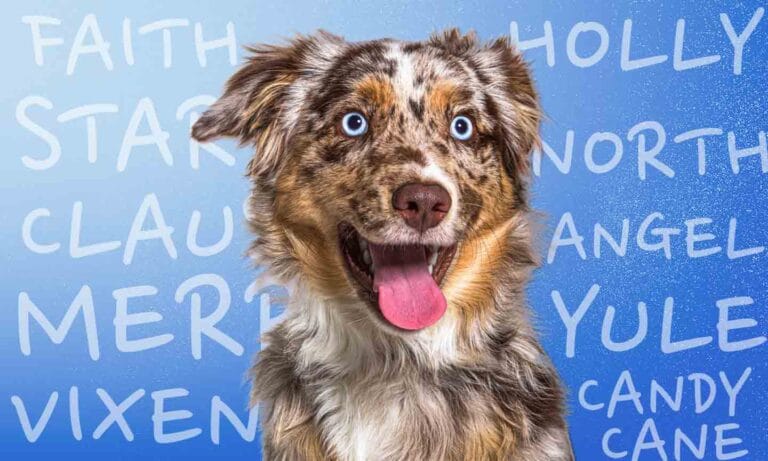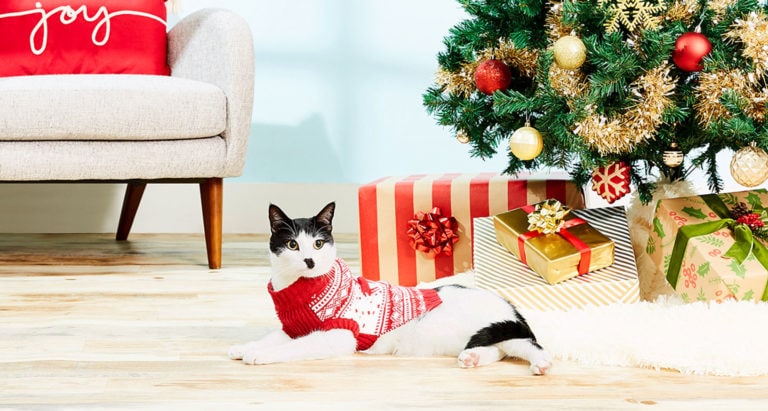Hit pause on Mariah Carey, and put down the mistletoe! Before decking the halls and trimming your tree, there are important holiday pet safety precautions pet parents need to take.
We spoke to Dr. Mary Gardener, DVM, veterinarian and cofounder of Lap of Love Veterinary Hospice about the traditional holiday decorations that could pose a risk to our furry family members. Don’t “bah humbug!” us, though: You still have plenty of décor options that feel festive and stylish!
Seasonal Flowers and Plants

- Poinsettias
- Lilies
- Mistletoe
- English ivy
- Rosemary topiary
- Holly
- Amaryllis
These all contain a toxicity that’s dangerous to dogs and cats, warns Dr. Gardener.
If you suspect your pet has nibbled on a toxic plant, give your vet a call immediately and keep an eye out for symptoms of plant poisoning, which include:
- Drooling
- Vomiting
- Gastrointestinal (GI) issues, such as diarrhea
- Lack of coordination or balance
Learn more about holiday plants poisonous to pets.
Christmas Trees

Watch out for the following when it comes to live Christmas trees:
- Needles: "Keep your pet from ingesting the needles," warns Dr. Gardner. "They can cause GI upset."
- Tree water: Keep pets from drinking the tree water, as it might cause stomach upset.
- Tinsel: "Cats love threads and ribbons, and they can get wrapped around their tongues and cause intestinal damage," says Dr. Gardner.
- Low-hanging glass ornaments: These are a no-no around wagging tails and pouncing felines. These can easily be knocked to the ground and broken, causing a hazard for both pets and people.
- Cords: Cords from Christmas tree lights can also be nibbled upon, which could lead to an electrical shock.
Seasonal Solutions
For a dog and cat-safe Christmas tree, consider the following:
- Opt for a faux fir, so you don’t have to worry about the needles.
- Place fragile ornaments high on the tree and use floral wire to affix them to the branches.
- Invest in shatter-proof ornaments for the lower branches. Don’t worry—there are some really pretty ones out there!
- Install pet-safe cord protectors on cords you can’t move out of reach.
- Set up a pet gate around your tree to create a physical barrier between furry friends and your holiday décor. Free-standing gates, like Frisco's Arch 4-Panel Solid Wood Dog Gate, can be placed anywhere.
Candles

Here's why candles pose a risk to pets:
- They're a fire hazard. If candles are placed too low or in a spot easily accessed by a pet, the pet can knock them over or brush against them accidentally. It's important to never leave a burning candle unattended in your house.
- They pose a respiratory risk to pets. Some scented home products may also pose a respiratory risk to pets, due to pets' more sensitive airways.
Learn more about pet-safe candles.
Seasonal Solutions
Consider the following candle-related tips this holiday season:
- Use LED candles. LED candles give a fairly realistic candlelit look if you want that festive, flickering illumination without the risk of a flame.
- Use pet-safe candles. If you prefer real candles, choose products that are specifically marketed as being safe for pets; candles that use natural soy wax, coconut wax, beeswax or vegetable-based wax over paraffin wax; and candles that use an unbleached 100 percent cotton wick, as lead wicks can be toxic. (Keep scrolling for our favorite pet-safe candles!)
- Keep real candles out of reach. Remember what we said about pets accidentally knocking them over or brushing against them?
- Place real candles in a vessel. That way the flame isn't exposed. Opt for jarred candles or encase pillar candles in glass cylinders.
Pet-Safe Candles for the Holidays
Holiday Sweets

Keep your pet away from the following holiday sweets:
- Chocolate: It may be tempting to leave a plate of chocolate chip cookies out for Santa, but the cookies can easily be gobbled up by hungry pets—and chocolate is poisonous to dogs and cats. "Chocolate, and especially baking chocolate, is a huge no-no," says Dr. Gardener.
- Candy and other sugary sweets: Sugar can cause gastric upset and weight gain, while sugar-free treats may contain xylitol—an artificial sweetener that is toxic to pets.
Seasonal Solutions
Here are two major tips to keep in mind when it comes to holiday sweets:
- Keep food and ingredients tucked away where pets can’t access them.
- Tell holiday visitors not to feed pets any human food. If they want to give your pet a treat, have some pet treats available that can be given instead. (Keep scrolling for our favorites!)
Accidents can happen, though, so look out for these signs that your pet might have indulged in something they shouldn’t have:
- Seizures
- Vomiting
- Lethargy
- Loss of coordination
- Muscle tremors
- A temp of over 103
Keep hydrogen peroxide in a pet first-aid kit in case of accidental ingestion of a dangerous food, Dr. Gardner says.
"If your pet gets into food they weren’t supposed to, call your vet who may suggest hydrogen peroxide to induce vomiting," says Dr. Gardner. "They’ll recommend a dosage based on weight." Never ever offer this remedy without your veterinarian’s instruction.
Holiday Treats for Dogs and Cats
Temporarily out of stock
More ways to have a fun and safe holiday season with your pet:
Share:
